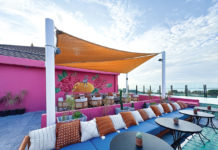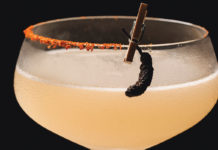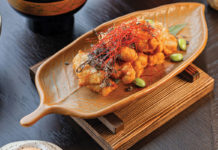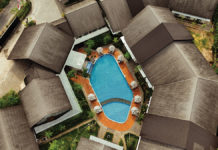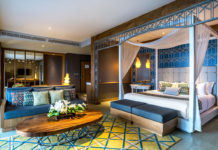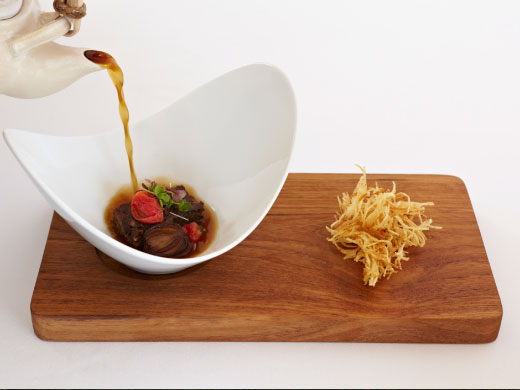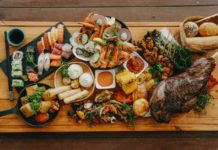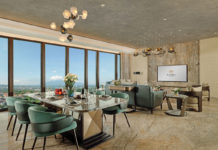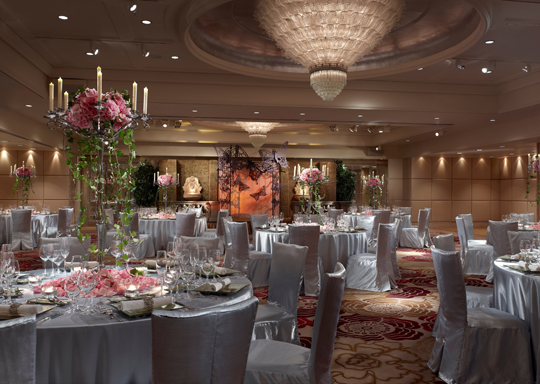This next entry to the Gourmand’s Guide provides a bit of a double whammy. KU DE TA is Asia’s most distinctive and beloved lifestyle destination, while inside its sprawling beachfront complex lies the laboratory kitchen concept, Mejekawi – an intoxicating and experimental dining experience unlike anything else on the Island of the Gods.
While a visit to KU DE TA is assuredly stamped onto the itineraries of almost every tourist to Bali, it is the phenomenal experience of Mejekawi that we want to highlight here (but of course, pre and post dinner cocktails at KU DE TA’s al-fresco bar are highly recommended).
Loosely translating to mean “sacred table”, Mejekawi is KU DE TA’s “tasting kitchen and laboratory concept” where Chefs Ben Cross and Will Goldfarb play with the freshest local produce and cutting-edge cooking techniques to create dishes that really push the boundaries.
The term “laboratory concept” is not just a marketing gimmick. Mejekawi probably has the most technologically advanced kitchen on the island, and one of the most sophisticated in the region. It is filled with gadgets like an immersion circulator, a rotary evaporator and even an ultrasonic homogeniser (just Google it) on hand to let the chefs push their craft to the extreme.
The Tasting Kitchen
Offering only eight and 12-course tasting menus, the goal of Mejekawi is to take each diner on a carefully choreographed culinary journey. There is also a wine pairing option that sees each of those courses accompanied by a thoughtfully chosen vino from KU DE TA’s extensive collection.
The first few courses consist of smaller dishes, like the suckling pig terrine served atop a sourdough crisp, or the latest ‘white cut’ chicken cooked sous vide and served with a szechuan salad and an oyster cream; but each of these light bites offer a complete sensory experience. A mound of smooth, firm-fleshed coral trout ceviche comes dressed with Balinese sambal matah (a traditional condiment utilising chilli, garlic, shallots and lime) which is aromatic and bursting with vibrant, fresh flavours. Pile the ceviche onto the delicately crisp slice of tempe to add texture and a nutty, earthy note.
Onto more heartier courses and the chefs serve up a dish near and dear to the heart of most Indonesians: sop buntut, or oxtail soup. At Mejekawi they have their own version of the dish, one that has been distinctly refined. A bowl of cherry tomatoes, raisins, charred onions, herbs and a piece of oxtail has been gently braised for six hours before being pressed and seared. The server then pours a broth over the mixture which is based on an umami-rich Japanese dashi. The smell of the broth, which is intensely meaty but without the usual gaminess of oxtail, wafted over my nose as I cut through the tender meat with just the edge of my spoon. The soup comes paired with a sake that recalls the Japanese broth base whilst also cleaning the palate.
Other memorable courses include the carotene gnocchi with smoked shimeji mushrooms and onion soubise, as well as Mejekawi’s take on an American Northeastern classic, the lobster roll. Their version actually uses barramundi and lobster, together with a lobster mousse flavoured with basa gede (an intense Balinese paste made of rich, aromatic spices). The mousse is then mixed with the barramundi & lobster, then wrapped in banana leaf to seal in the fragrant flavours. Each bite carries a subtle smoky flavour from the coconut wood in which it is grilled over, superbly matched to the piquancy of a sambal dabu dabu and a crunchy rice krupuk.
You might think that after so many rich, flavourful dishes, the tongue might get tired, but the chefs here know just how to orchestrate a meal, with rich, spicy, sour and creamy tastes and textures played strong in one course and silenced in another. The meal came to its crescendo for me with the final savoury course: the slow roasted lamb shoulder. Like the oxtail, the lamb gets cooked long and slow before being pressed and seared. The meltingly tender meat is then rested in a small puddle of rendang jus, carrying with it the intense flavour of the evaporated coconut curry without overpowering the meat. This winning combination is served alongside a schmear of a deeply rich and smoky parsnip pureé (I could easily have eaten a bowl of the stuff by itself) and some spicy urap; an Indonesian salad of vegetables and coconut to balance the other elements on the plate.
While the lamb may have been the climax for me, the desserts, courtesy of renowned Pastry Chef Will Goldfarb, provided some of the biggest delights of the dinner. In particular, my dining companion and I were tickled by his signature Pandanbert, served in a custom-printed container that makes it look like an actual round of cheese produced via panda. Inside the package you’ll find a luscious panna cotta flavoured with pandan leaf and smoked vanilla. It comes topped with poached nutmeg fruit, salak (snake fruit) and crumples of crispy mung bean. The panna cotta is appropriately rich without being too sweet, and the brightness of the pandan leaf is a great foil to the vanilla and fruits. It’s playful and profound at the same time, which could easily be said of the entire meal.
After making our way through all of the twelve courses, I was amazed to find I was still capable of standing up. Don’t get me wrong, you might feel quite full and fuzzy-headed from all the wine, but you won’t have that bloated feeling of impending food coma. Overall, Mejekawi is a truly fantastic dining experience of orchestrated mastery, one that you won’t want to miss when travelling to Bali.
The Perfect Pairings
The suckling pig ‘urutan’ terrine kicks off the meal with some exquisite bubbles: Louis Roederer’s Brut Premier NV.
The delicious richness of the Champagne enhances the terrine’s meatiness, with the added contrast of delicate bubbles against intense, complex flavours.
The lamb shoulder meets a powerful pairing with a Spanish 2008 Bodegas Alión.
This red wine has an incredible purity to it with great length and definition. Just like the lamb, it is wonderfully spiced, while its touch of blackberry flavours marries itself to the sweetness of the dish’s parsnip pureé.
Will Goldfarb’s Pandanbert dessert is paired with a French white – the 2012 Domaine du Tariquet les Premières Grives.
It is perhaps our favourite pairing of the meal, where exotic, citrus fruits mix with a beautiful, buttery smoothness that enhances that of the panna cotta.


